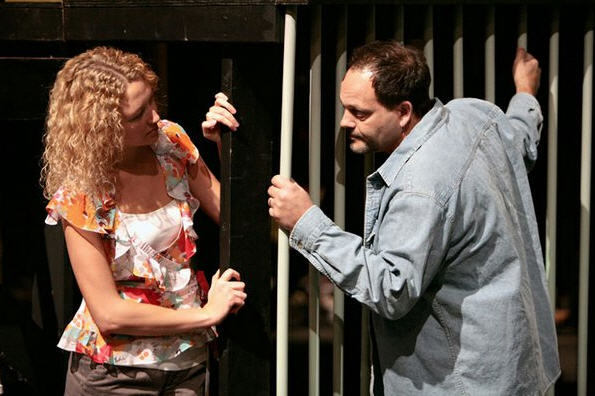Thursday, November 19th, 2009
Theater group to stage final performance
By Alex Garrison
After 21 years of pushing the boundaries, the English Alternative Theater is closing its curtain for the last time.
The nationally recognized group — the only theater production group run by an English department in the U.S. — is staging its final performance this weekend at the Lawrence Arts Center, 940 New Hampshire St. The performance will be a full production of “What Really Happened,” an original play by Benjamin Smith, Rose Hill graduate student.
Paul Lim, professor of English, founded EAT in 1989 as a forum for his playwriting students’ original work. It has put on full performances and staged readings of student work ever since, giving students the opportunity to see their work come to fruition and helping them develop their writing, he said. Many students have gone on to win regional and national awards for their plays.
Smith said EAT became a great part of the University because of its willingness to produce edgy work and its focus on developing up-and-coming playwright voices.
Smith pointed to University Theatre’s current production of Tennessee Williams’ 1944 classic “The Glass Menagerie” as a money-making production that helped students develop as theater actors and producers, but not as writers.
 |
Lizzie Hartman, left, and Phillip Shroeder walk along the bars of a prison cell in a scene of "What Really Happened." The full-length play in one act will be the final performance for English Alternative Theatre at the Lawrence Arts Center with performances on Saturday at 7:30 p.m. and Sunday at 2:30 p.m. The play was written by Benjamin Smith and directed by Jeremy Riggs.
(Photo by Adam Buhler) |
“It’s been 60 years since ‘The Glass Menagerie.’ I love Tennessee Williams, but can’t someone else come along?” Smith said. “EAT helps find the new Tennessee Williams.”
In the beginning especially, EAT also provided innovative art to the community by producing works written by minority authors.
“We were the only ones doing it,” Lim said.
But EAT’s willingness to push the envelop led to a constant struggle to survive economically. Lim is retiring later this year and without him, EAT, which has been funded by small grants and contributions by Lim, will no longer continue. Because of budgetary concerns, the department will not be hiring another playwriting professor, at least not in the immediate future, said Marta Caminero-Santangelo, chairwoman of the department.
Lim said it was difficult to give up the “extremely rewarding experience” of working with students and EAT, but said that he wanted the opportunity to write plays himself.
“Before 1989, I wrote one play per year, but I’ve been a one-man band with this,” he said. “I’ve only written two plays since. I want to be able to write while I still can.”
Caminero-Santangelo said EAT was a huge part of the department’s culture for both students and faculty.
“It’s an educational opportunity, but it’s so much more,” she said. “When it becomes a real production, it’s not just a classroom activity anymore. There’s a sense of teamwork to get the play shown — that’s why these plays win so many awards.”
Byron Myrick, 1993 graduate who performed in EAT productions while he was a student and is now a cast member of “What Really Happened,” said that the loss of EAT would leave a “huge void” in the Lawrence community, but that he still held out hope it could continue in some way.
“It’s so sad to see it go,” he said. “I want to try to keep it alive.”
Original Story Located Here
(Return to Top) |

